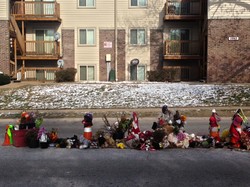Just a short distance from where Michael Brown’s bloody body lay in the streets for hours after being gunned down on August 9, the National Council of Churches of Christ in the USA (NCC) gathered Tuesday to stand in solidarity with those crying out for justice.
“We are in partnership with pastors and congregations who are preaching, seeking justice, and providing pastoral care in Ferguson’s churches in the midst of the current tensions,” the NCC said from inside Wellspring Church in Ferguson, Mo. “It is our hope that the city and its citizens, churches, law enforcement officials, justice-seekers, and media will all be shepherded by the teaching of Jesus to love God and to ‘love your neighbor as yourself.’”
The NCC is a fellowship of diverse Christian communions, including the Presbyterian Church (U.S.A.), representing 45 million people in more than 100,000 local congregations. The organization made a conscious decision to hold its executive committee and governing board meetings in St. Louis, November 17–18, in the aftermath of Michael Brown’s death.
“The NCC chose to meet in St. Louis so it could both offer support to its local congregations and hear their stories of the impact of the Michael Brown tragedy,” said the Reverend Gradye Parsons, Stated Clerk of the General Assembly of the PC(USA) and a member of the NCC executive committee.
“The statement supports local congregations and reminds all of the communions that there are Fergusons in every city and town. I hope momentum will build to have the hard, honest conversations we need to have in all of our congregations about race.”
The NCC’s visit came as the city of Ferguson, the state of Missouri, the United States, and the world wait for the grand jury in Ferguson to determine whether Officer Darren Wilson should be indicted for Brown’s death. Tensions remain high, and Missouri’s governor has already declared a state of emergency and activated the National Guard.
“Peace is not merely the absence of conflict; it is also the presence of justice. Peace is found in the ability to dialogue, to see each other’s side, and to come to a point where relationships are transformed from those of conflict to conversation,” the NCC statement said. “The bridge between justice and peace is mercy and grace, and as people of faith, we affirm this bridge, and that the Church, its pastors, and its members, must be those who proclaim it.”
A call for the Church at-large to proclaim justice and be agents of systemic change also came from some of the Ferguson leaders who shared with NCC members during their gathering.
Peace is not merely the absence of conflict; it is also the presence of justice.
In the aftermath of Michael Brown’s killing the protests started, and it was mostly young people in their teens and 20s who refused to be quiet, said the Reverend Traci Blackmon, pastor of Christ the King United Church of Christ in Florissant, Missouri. Those young people were wondering where the church was, which nobody should have to ask, she said.
“There is a divide between young people and the church,” she said. “I believe we have not been there because of fear.”
Blackmon, who has been and remains on the front lines of the Ferguson situation, said when the church has fear it loses its prophetic voice.
The Church “must stand as moral consciousness,” which includes making spaces for people to have open and authentic conversations, she said. “We must stand loudly.”

